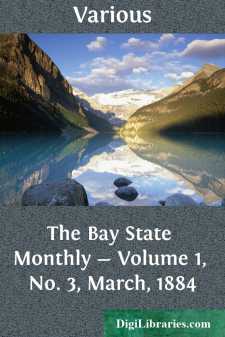Categories
- Antiques & Collectibles 13
- Architecture 36
- Art 48
- Bibles 22
- Biography & Autobiography 813
- Body, Mind & Spirit 142
- Business & Economics 28
- Children's Books 15
- Children's Fiction 12
- Computers 4
- Cooking 94
- Crafts & Hobbies 4
- Drama 346
- Education 46
- Family & Relationships 57
- Fiction 11829
- Games 19
- Gardening 17
- Health & Fitness 34
- History 1377
- House & Home 1
- Humor 147
- Juvenile Fiction 1873
- Juvenile Nonfiction 202
- Language Arts & Disciplines 88
- Law 16
- Literary Collections 686
- Literary Criticism 179
- Mathematics 13
- Medical 41
- Music 40
- Nature 179
- Non-Classifiable 1768
- Performing Arts 7
- Periodicals 1453
- Philosophy 64
- Photography 2
- Poetry 896
- Political Science 203
- Psychology 42
- Reference 154
- Religion 513
- Science 126
- Self-Help 84
- Social Science 81
- Sports & Recreation 34
- Study Aids 3
- Technology & Engineering 59
- Transportation 23
- Travel 463
- True Crime 29
The Bay State Monthly - Volume 1, No. 3, March, 1884
by: Various
Categories:
Description:
Excerpt
Hon. JOSIAH GARDNER ABBOTT, LL.D.
By Colonel John Hatch George.
The Honorable Josiah Gardner Abbott, the subject of this biographic sketch, traces his lineage back to the first settlers of this Commonwealth. The Puritan George Abbott, who came from Yorkshire, England, in 1630, and settled in Andover, was his ancestor on his father's side; while on his mother's side his English ancestor was William Fletcher, who came from Devonshire in 1640, and settled, first, in Concord, and, finally, in 1651, in Chelmsford. It may be noted in passing that Devonshire, particularly in the first part of the seventeenth century, was not an obscure part of England to hail from, for it was the native shire of England's first great naval heroes and circumnavigators of the globe, such as Drake and Cavendish.
George Abbott married Hannah, the daughter of William and Annis Chandler, whose descendants have been both numerous and influential. The young couple settled in Andover. As has been said, ten years after the advent on these shores of George Abbott came William Fletcher, who, after living for a short time in Concord, settled finally in Chelmsford. In direct descent from these two original settlers of New England were Caleb Abbott and Mercy Fletcher, the parents of the subject of this sketch. Judge Abbott is, therefore, of good yeomanly pedigree. His ancestors have always lived in Massachusetts since the settlement of the country, and have always been patriotic citizens, prompt to respond to every call of duty in the emergencies of their country, whether in peace or war. Both his grandfathers served honorably in the war of the Revolution, as their fathers and grandfathers before them served in the French and Indian wars of the colonial period of our history. In his genealogy there is no trace of Norman blood or high rank: but
"The rank is but the guinea's stamp,
The man's the gowd for a' that."
In this country, while it is not necessary to success to be able to lay claim to an aristocratic descent, it is certainly a satisfaction, however democratic the community may be, for any person to know that his grandfather was an honest man and a public-spirited citizen.
Judge Abbott was born in Chelmsford on the first of November, 1814. He was fitted for college under the instruction of Ralph Waldo Emerson. He entered Harvard College at the early age of fourteen and was graduated in 1832. After taking his degree, he studied law with Nathaniel Wright, of Lowell, and was admitted to the bar in 1837. In 1840, he formed with Samuel A. Brown a partnership, which continued until he was appointed to the bench in 1855.
From the very first, Judge Abbott took a leading position in his profession, and at once acquired an extensive and lucrative practice, without undergoing a tedious probation, or having any experience of the "hope deferred which maketh the heart sick." In criminal cases his services were in great demand. He had, and has, the advantage of a fine and commanding person, which, both at the bar and in the Senate, and, in fact, in all situations where a man sustains the relation of an advocate or orator before the public, is really a great advantage, other things being equal....












